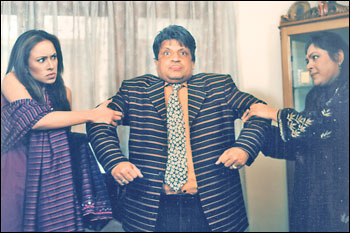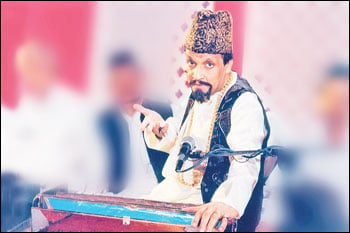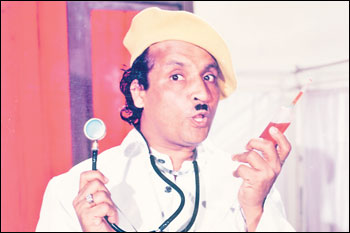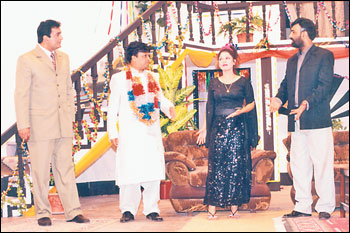Omer Sharif's
office where we're supposed to meet, is located deep within the
recesses of Gulistan-e-Johar in Karachi. He patiently explains the
way to me over the phone but when I am still dumbfounded, he quips,
ÒSince you're a female, I'll explain the route according
to the shopping areas that come in the way.Ó Traversing past
at least five different malls, he re-explains and this time around,
I manage to figure the way out! I meet up with Omer Sharif expecting
him to be a barrel of laughs. The man is an icon; he practically
invented modern day Pakistani comedy. All our most popular jokes
- in fact, even most of the jokes being shot around on TV by other
so-called comedians - were once penned by him. Twice, he has co-hosted
the well-known Bollywood-based Zee Cine awards and he regularly
travels abroad to do comedy shows. True, he has probably cracked
some of his most famous jokes while dressed as a hick Makrani or
a polygamous, libidinous scientist. More than once, he has broken
into ribald belly dances in the middle of particularly hilarious
comic acts.
 But
that's just his style. Omer hails from Karachi's eventful, frenetically-paced
middle class and success hasn't made him want to hide his roots.
He still makes fun of the English language, still jest-fully criticizes
latest fashions and 20 years ago, he jokingly named the elite class
'burgers' - due to their propensity for fast food. His comedy is
without pretensions. He makes no bones about who he is and what
he finds funny. Less confident comedians may balk at coaxing an
actor as reticent as Aamir Khan to sing 'Aati Kya Khandala', coquettishly
accompanying him with the female part of the duet. Omer Sharif did
it at the drop of a hat. ÒMy jokes are for the common man
who is faced with daily tensions,Ó he says. ÒI've
never aimed to please 'burgers'. But
that's just his style. Omer hails from Karachi's eventful, frenetically-paced
middle class and success hasn't made him want to hide his roots.
He still makes fun of the English language, still jest-fully criticizes
latest fashions and 20 years ago, he jokingly named the elite class
'burgers' - due to their propensity for fast food. His comedy is
without pretensions. He makes no bones about who he is and what
he finds funny. Less confident comedians may balk at coaxing an
actor as reticent as Aamir Khan to sing 'Aati Kya Khandala', coquettishly
accompanying him with the female part of the duet. Omer Sharif did
it at the drop of a hat. ÒMy jokes are for the common man
who is faced with daily tensions,Ó he says. ÒI've
never aimed to please 'burgers'.
Ó Nevertheless, his jokes please just about anybody who speaks
and understands Urdu and his fans are dispersed all over the world.
He has an uncanny way of knowing exactly what to ridicule in precisely
the right way. So, while anybody else enacting a lascivious police
officer on stage will probably appear obscene and ruffle quite a
few feathers - when Omer Sharif does it, it may still be bawdy but
you can't help but laugh. Recalling the good old days back in 1974,
when he first began his career, he says, ÒI was born to be
an actor. I am at my best when I am on stage, although I have also
worked in television and films.
I love performing live because I can say whatever I please and get
an immediate response from the audience.Ó ÒIf they
don't like a joke,Ó he continues, ÒI can quickly reiterate.
Sometimes I have stood on stage for three hours on end, while other
co-actors have come and gone.Ó ÒI don't think I've
ever gotten stage fright or forgotten my lines,Ó says Omer.
This is quite a feat considering that he has written, directed and
acted in more than 175 dramas in the past 36 years. Omer's career
as a comedian began, quite aptly, with a funny incident. Back when
he was still in school, Omer decided to play a prank on his neighbor,
an old man with a multitude of children. Dressed as a djinn, he
entered the man's home and all hell broke lose. So convincing was
he as a bloodcurdling djinn that one of the girls, a college student,
fainted and had to be hospitalized. News of Omer's antics reached
the girl's college and he was asked to perform as a djinn in the
upcoming college play. That was Omer's first tryst on stage. And
the rest is showbiz history. Initially though, Omer's stage endeavors
were not appreciated. In his first play, Chiragh Talay Andhera,
the director was exasperated by Omer's tendency to add to his dialogues.
ÒBack then, a play would be staged for just one day but it
would be preceded by month-long rehearsals,Ó he explains.
 The
director would be strict about following the dialogue word-by-word.
But when I came on stage, I couldn't help adding bits of my own
to the lines. The audience laughed at these improvisations although
the caste and crew weren't too pleased. I was berated a few times
but when I continued to do this in successive plays, people stopped
wanting to work with me.Ó Now on the contrary, it is this
very spontaneity that has Omer's audience rolling in the aisles.
Quick-witted and glib, he hardly ever needs to follow a script -
the jokes come naturally. ÒIn a stage drama, I never stick
to the script dialogues. Even in my talk show, The Shareef Show,
I don't have a pre-written script or a list of questions to ask
my guests. I just know their backgrounds and have a few pointers.
When the show begins, I interview them in the course of conversation.Ó
In The Shareef Show, currently being aired on Geo TV, the guest
list ranges from politicians to film actors to bona fide ghazal
singers. Talk shows are dime a dozen on TV these days but The Shareef
Show stands out not just because of the impressive guests but also
due to Omer's ability to shower Pakistan's rich and famous with
the most audacious questions. The
director would be strict about following the dialogue word-by-word.
But when I came on stage, I couldn't help adding bits of my own
to the lines. The audience laughed at these improvisations although
the caste and crew weren't too pleased. I was berated a few times
but when I continued to do this in successive plays, people stopped
wanting to work with me.Ó Now on the contrary, it is this
very spontaneity that has Omer's audience rolling in the aisles.
Quick-witted and glib, he hardly ever needs to follow a script -
the jokes come naturally. ÒIn a stage drama, I never stick
to the script dialogues. Even in my talk show, The Shareef Show,
I don't have a pre-written script or a list of questions to ask
my guests. I just know their backgrounds and have a few pointers.
When the show begins, I interview them in the course of conversation.Ó
In The Shareef Show, currently being aired on Geo TV, the guest
list ranges from politicians to film actors to bona fide ghazal
singers. Talk shows are dime a dozen on TV these days but The Shareef
Show stands out not just because of the impressive guests but also
due to Omer's ability to shower Pakistan's rich and famous with
the most audacious questions.
Smoothly, smilingly, he has no qualms interrogating politician Sheikh
Rasheed about his days in jail or Mustafa Khar about his numerous
marriages. ÒI really enjoyed interviewing Mustafa Khar,Ó
he laughs. ÒInstead of asking him upfront how many times
he had married, I grilled him about the age of his youngest child.
At first, he was disconcerted and tried to dodge the question but
eventually he admitted that his youngest child was just one and
a half years old!Ó Surprisingly, no matter how personal the
questions, his guests don't take offense or they don't show their
displeasure, at least. Pakistan's most eminent personalities laugh
self-deprecatingly and go on to answer probing questions regarding
love affairs, rivalries, scandals, et al. ÒI think when people
are invited to my show, they know what to expect,Ó he reasons.
ÒBesides, my questions may be brazen but I am never disrespectful.
I sugarcoat
whatever I say and I think my guests appreciate that.Ó Occasionally,
guests react to his interrogations with personal questions of their
own. 
When interviewing Sharmila Farooqi he asked her about her love life
and she retaliated by questioning him right back on how he was able
to manage two wives at the same time. ÒI didn't mind her
questions at all,Ó he professes spiritedly. ÒI am
very honest about who I am and have nothing to hide. Yes, I have
married twice but I feel that it is better to displease your wife
than to displease God by sinning. I've also put this view forward
in the religious book I have written.Ó He considers himself
a very religious man and his soon to be published book on religion
focuses on Qura'nic verses and Allah's many blessings. In fact,
throughout our conversation, Omer makes frequent references to the
Qur'an, sinning and virtue. Also during our talk, he occasionally
quotes poetic verses, some of renowned Urdu poets and others which
he has written himself. Up for release alongside his theological
book is a book of poetry that he has penned, a collection of short
stories and a compilation of the scripts of some of his more popular
stage dramas. ÒWhen I started out, I was inspired by Munawar
Zareef. I have written this book on stage dramas as a reference
for aspiring comedians,Ó he says. Omer's book writing reveals
a more introspective, serious side to the comedian. Contrary to
expectations, he isn't always a wisecracking, rollicking comic act.
The man certainly is witty but he is just as earnest when discussing
the evils of load shedding and water shortage. He jokes as a matter
of course but, just as willingly, he quotes Urdu poets like Ghalib
and Faiz Ahmed Faiz. He loves to make people laugh but he is just
as passionate about raising funds for a hospital he is building
in Karachi's Orangi Town, Maa. ÒI have won so many awards
and have such a large fan base,Ó he says. ÒNow, my
dream is to have the Maa hospital completed and functioning. It
is a large project and requires heavy investment. Wherever I go,
whatever work I am doing, I try to raise funds on the side. I hope
to have the hospital functional by January next year.Ó Orangi
Town, where Maa's foundations have been laid down, is one of the
most impoverished and neglected areas of Karachi. According to a
survey of the area conducted by Omer Sharif's Welfare Trust, women
and children living in the area are more susceptible to disease.
Thus Maa is going to focus especially on the plight of women and
children, with 200 beds and medical care available for anyone who
can't afford to pay his or her own bills. Ò50 of the beds
will be for people involved in showbiz,Ó plans Omer. ÒMany
of these people live in the most destitute conditions and I especially
want to do this service for them.Ó Recently Omer toured the
U.S.A. and organized fundraising shows for Maa in different cities.
As a Pakistani attempting to raise funds in the U.S., I ask him
if he faced any skepticism. ÒNot at all,Ó he asserts.
ÒMy work was investigated by the U.S. government before I
was allowed into the country. 
The shows went very well and I received a lot of support from the
Urdu and Hindi speaking communities over there.Ó Whether
he is fundraising or not, Omer is one of the lucky few who doesn't
usually have to deal with unnecessary red tape or racial intolerance.
The world may be plagued by terrorism and prejudice, but Omer is
welcomed by loyal fans wherever he goes. It seems that his jokes
hardly ever go wrong. When he was invited to host the Zee Cine Awards
in 2004, he was advised not to poke fun at Amitabh Bachchan. It
was feared that the raillery of a star of Bachchan's iconic status,
that too by a Pakistani, may not go down well with the audience
as well as with the actor himself. Standing live on the podium -
pluckily, typically - he chose Big B as his very first victim. Everybody,
including Mr Bachchan, laughed - no offense taken. Such is his comic
acumen that Pakistani comedians visiting India often openly lift
his jokes during their comic acts, passing them off as their own,
and manage to make a name for themselves. Many of these comedians
started their careers in Omer's stage dramas and honed their comic
skills under his tutelage. Strangely enough, Omer is quite calm
about their outright plagiarism. ÒAll I feel is disappointment
when I see them on TV, lifting my jokes,Ó he says. ÒHere,
they have been provided with a platform through which they can establish
themselves and all they do is plagiarize. They may be able to get
a few laughs right there and then but people know that these jokes
have been lifted and are not these comedians' original creations.Ó
ÒLeft to their own devices, look at the kind of shows they
are coming up with,Ó he points out. ÒThe comic shows
on TV can hardly be considered funny. They are too busy trying to
imitate other comic acts to come up with something new.Ó
Omer's jokes, on the other hand, never cease to be innovative. There
are new jokes in every show that he does - some preconceived and
others, formulated right there and then on stage. And even his old
jokes are still hilarious - ÒWhy do women die less? They
wear so much make-up that when they take it off at night, the angel
of death fails to recognize them.Ó He has recently been signed
up to write, direct and act in an Indian movie which is sure to
be hilarious. I ask him how he comes up with his jokes and he simply
says that Òhe just thinks them upÓ. With writing,
acting, directing, hosting as well as charity work in his daily
agenda, Omer often comes back home in the early hours of the morning.
He has diabetes and has undergone a bypass but that hasn't deterred
him from working to the hilt. ÒI want my name to be in the
Guinness Book of World Records,Ó Omer reveals of his future
plans. He already has international success in stage, film, television
and stand-up comedy to his credit, the book of world records is
really all that's left for him to achieve. And knowing his workaholic
ways, his comic genius and his sheer energy, Omer Sharif just might
make it happen!
|

